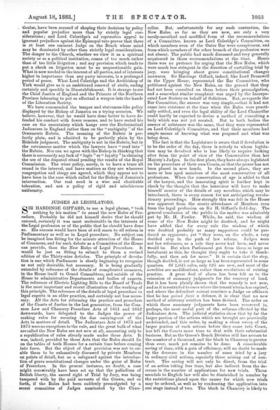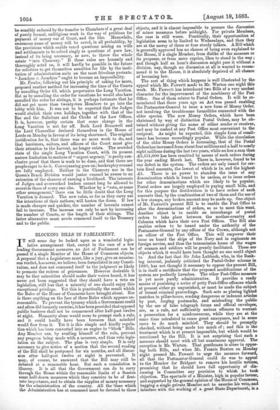JUDGES AS LEGISLATORS.
SIR HARDINGE GIFFARD, to use a legal phrase, " took nothing by his motion " to annul the new Rules of Pro- cedure. Probably he did not himself desire that he should succeed, certainly it was most undesirable in the interests of the Legal profession or of the public that he should have done so. His success would have been of evil omen to all reform in Parliamentary as well as in Legal procedure. No subject can be imagined less fitting for the minute attention of the House of Commons, and for such debate as a Committee of the House can provide, than the New Rules of Legal Procedure. It would be just as fitting to submit to them a revised edition of the Thirty-nine Articles. The principle of devolu- tion is one which Parliament is slowly beginning to recognise as not only desirable. but necessary. It is being gradually extended by reference of the details of complicated measures, in the House itself to Grand Committees., and outside of the House to administrative Departments and bodies of experts. The reference of Electric Lighting Bills to the Board of Trade is the most important and recent illustration of the working of this principle. The reference of the details of legal procedure to legal experts is an older practice, and certainly not less neces- sary. All the Acts for reforming the practice and procedure of the Courts of Justice in the last generation, from the Com- mon Law and Chancery Procedure Acts of 1851 and 1852 downwards, have delegated to the Judges the power of making rules for securing the due carrying-out of the Acts in matters of detail. The Judicature Acts of 1873 and 1875 were no exceptions to the rule, and the great bulk of what are called the New Rules are not new at all, amounting only to a republication of rules already made under those Acts. It was, indeed, provided by those Acts that the Rules should lie on the tables of both Houses for a certain time before coming into force. But the object of that provision was not to en-
able them to be exhaustively discussed by private Members on points of detail, but as a safeguard against the introduc- tion of grave constitutional changes under the guise of Rules of Procedure. In the present instance, no doubt, a case might conceivably have been set up that the palladium of British liberty, the sacred right of Trial by Jury, was being tampered with by the paid servants of the Crown, and so forth, if the Rules had been suddenly promulgated by a secret committee of Judges nominated by the Chan-
cellor. But, unfortunately for any such contention, the New Rules, so far as they are new, are only a very mealy-mouthed and modified form of the recommendations of a Committee, known as Lord Coleridge's Committee, on which members even of the Outer Bar were conspicuous, and from which members of the other branch of the profession were not absent. The public had much discussed and very generally acquiesced in those recommendations at the time. Hence there was no pretence for urging that the New Rules, which were much less stringent in the direction of curtailing trial by jury, were bringing about grave constitutional changes unawares. Sir Hardinge Giffard, indeed, like Lord Bramwell in the Upper House, represented the Bar Committee, who petitioned against the New Rules, on the ground that they had not been consulted on them before their promulgation, and a somewhat similar complaint was urged by the Incorpo- rated Law Society on behalf of Solicitors. But, as regards the Bar Committee, the answer was very simple,—that it had not come into existence at the time when the Rules were practi- cally settled, and even the legal ability of the Lord Chancellor could hardly be expected to devise a method of consulting a body which was not yet created. But to both bodies the answer of substance was the same, that they were represented on Lord Coleridge's Committee, and that their members had ample means of knowing what was proposed and what was being done.
The fact is that the Legislature is aware that if devolution is to be the order of the day, there is nobody to whom legisla- tion may be devolved who is less likely to require looking after from the point of view of the Conservative than her Majesty's Judges. In the first place, they have always legislated on the procedure of their own Courts, so that the power has not been placed in new hands. In the second place, they are more or less aged members of the most conservative of all professions. When the conservatism of age is added to that of the lawyer, and the innovating spirit is further kept in check by the thought that the innovator will have to make himself master of the details of any novelties which may be introduced, there is every reason for not anticipating revolu- tionary proceedings. How strongly this was felt in the House was apparent from the scanty attendance of Members even from the legal profession on Sir H. Giffard's field-day. The general conclusion of the public in the matter was admirably put by Mr. H. Fowler. While, he said, the wisdom of some of the New Rules might be doubted, and he might have added that for every rule the wisdom of which was doubted probably as many supporters could be pro- duced as opponents, yet " they were, on the whole, a very decided step in the path of law reform. Judges were not law reformers, as a rule they never had been, and never would be. But when Parliament got from them so large an instalment as this, he thought they ought to take it thank- fully, and then ask for more." It is certain that the step, though decided, is not as large as has been represented in some quarters. Of 1,045 rules, only 125 are new, and most of the novelties are modifications, rather than revolutions of existing practice. A great deal of alarm has been felt as to the extension of summary judgments for the recovery of land. But it has been plainly shown that the remedy is not new, and as it is restricted to cases where the tenant's term has expired, and where the defendant cannot convince a Judge on affidavit that he has priuui facie a defence, it is clear that no new
method of arbitrary eviction has been devised. The order on which these summary judgments have been recovered is, perhaps, the most useful part of the reforms effected by the Judicature Acts. The judicial statistics show that by far the larger portion of the actions which are brought are practically undefended, and this order, by making a clean sweep of the larger portion of such actions before they come into Court, has left the Courts more time to deal with their substantial business. But as the Queen's Bench Division still has arrears to the number of a thousand, and the block in Chancery is greater than ever, much yet remains to be done. A considerable saving of time, with a gain of efficiency, will no doubt be made by the decrease in the number of cases tried by a jury in ordinary civil actions, especially those arising out of con- tract. The saving will not only be direct, from the trial of an action taking less time, but also indirect from the de- crease in the number of applications for new trials. These
scandals to English law will also be diminished in number by the restrictions placed upon the causes for which new trials may be ordered, as well as by condensing the application into one stage instead of two. The block in Chancery is likely to be sensibly reduced by the transfer to Chambers of a great deal of purely formal, unlitigious work in the way of petitions for payment of money out of Court, and the like. Meanwhile, enormous sums of money will be saved, in all probability, by the provisions which enable vexed questions arising on wills and settlements to be solved singly as questions of pure law, instead of its being necessary, as now, to throw the whole estate " into Chancery." If these rules are honestly and thoroughly acted on, it will hardly be possible in the future for solicitors to get themselves annuities for life by the insti- tution of administration suits on the most frivolous pretexts. "Jarndyce v. Jarndyce" ought to become an impossibility.
Mr. Fowler, following out his principle of asking for more, proposed another method for increasing the time of the Courts by annulling Order G3, which perpetuates the Long Vacation. But as by annulling the order for vacations he would also have annulled the order for sittings, it is perhaps fortunate that he did not get more than twenty-two Members to go into the lobby with him. It was not to be expected that the Judges would abolish their own holidays, together with that of the Bar and the Solicitors and the Clerks of the Law Offices. It is, however, pretty certain that some change in the Long Vacation is not far off. Both Lord Bramwell and the Lord Chancellor declared themselves in the House of Lords on Monday in favour of its being shortened. The original justification for it, that there was no more work to do, and that barristers, suitors, and officers of the Court must give their attention to the harvest, no longer exists. The crowded state of the single Long Vacation Court, with its present narrow limitation to matters of " urgent urgency," is pretty con- clusive proof that there is work to be done, and that there are people eager to do it. Conveyancing goes on; bankruptcy counsel are fully employed. Neither in the Chancery nor in the Queen's Bench Division would junior counsel be averse to an extension of the chances of earning a livelihood. The interests of Judges and overworked leaders cannot long be allowed to override those of every one else. Whether by a "rota, or some other arrangement," there can be little doubt that the Long Vacation is doomed. The new rules, so far as they carry out the intentions of their authors,-will hasten the doom. If law is made cheaper and quicker, the number of lawsuits cannot fail to increase. The increase can only be met by increasing the number of Courts, or the length of their sittings. The latter alternative must needs commend itself to the Treasury and to the public.



































 Previous page
Previous page